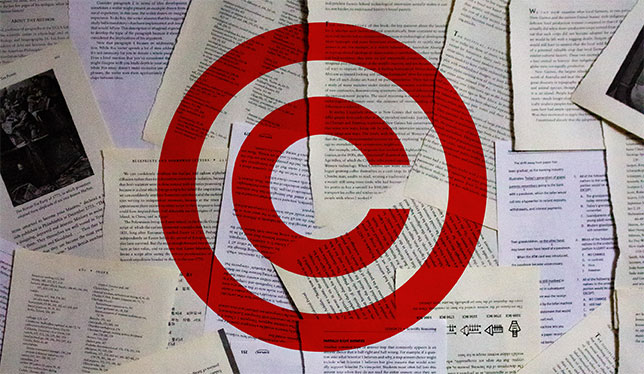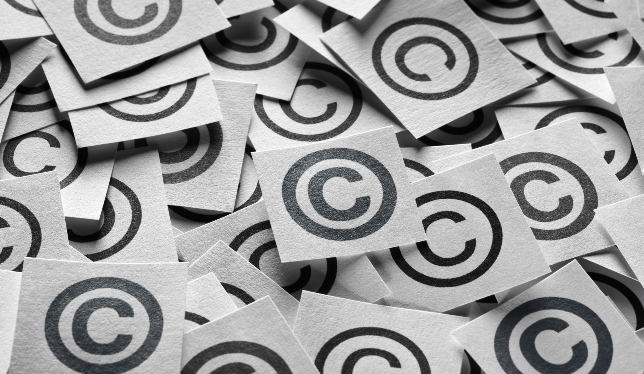Copyright advocacy and reform update in 2022
More voices need to be heard in this debate.

Writers are readers first. Readers are writers too. Teachers and researchers are both content creators and users. Publishers seek exclusive rights, but also depend on a vibrant public domain and user rights to create compelling works of art and literature. Educational institutions facilitate access to knowledge in every form, but also defend their own from exploitation.
This is why the touchstone of Canada’s copyright regime is balance: the balance of interests between content creators/owners and what are often described as “users” (i.e. the reading, viewing, listening public).
Copyright law is venerable, tracing its roots to the Statute of Anne, also known as the Copyright Act of 1710, though copying laws were around in different forms before then. So, it’s fair to say that these issues and trade-offs are not new. Over the past 25 years, many readers will have bumped up against copyright in the context of online file sharing, where, suddenly one could get “free” access to music and movies. Of course, it was not ‘free’, except in the sense that it was all too often consequence-free (with most people never receiving an infringement notice, or being pursued for copyright infringement).
But, the law and markets have, and continue to, adapt to maintain balance.
A change in 2012
Parliament made an effort to evolve copyright law in 2012. It’s been a decade and we again see copyright is again taking a (small) place in the public discourse, thanks to the Canadian government’s budget statement, which affirms “The government is committed to ensuring that the Copyright Act protects all creators and copyright holders. As such, the government will also work to ensure a sustainable educational publishing industry, including fair remuneration for creators and copyright holders, as well as a modern and innovative marketplace that can efficiently serve copyright users.”
That this is a government priority goes to show what a determined public and government relations campaign can do. This campaign has been led by the publishing industry, which has real concerns about the impacts of the 2012 round of copyright reform, and subsequent judicial decisions, on Canadian authors. Those changes, amongst many other things, expanded fair dealing to include copying for educational purposes, and confirmed that instructors are in a “symbiotic” relationship with learners, and thus copying for the classroom is not somehow separate from student learning.
Unfortunately, the publishing community is dominating current public discourse about copyright reform, throwing it off balance. The main argument the community presents is that, since 2012, Canadian authors have suffered extraordinary losses because educators have adopted a liberal interpretation of their rights under the current Copyright Act. Their solution is to eliminate or severely constrain the rights of all educators to copy any works for educational purposes, and force institutions (or students) to pay annual per-student fees for the right to copy small portions of works for the classroom.
To be clear, the publishers’ voices and perspectives are important, as they are a vital part of our creative cultural community. However, striking a balance is also important, so I offer the following observations to add to the mix:
What could those additional voices be saying?
Lots of things. For example, that Canadian educational institutions, since 2012, have actually increased their spending on purchasing content for use in classrooms. As you’d expect nowadays, a lot of that content is digital, which reduces the need to make copies (when an instructor assigns a reading from an ebook or e-journal purchased by the institution’s library, each student can access it from the institution’s database, and there is no additional compensable copying activity).
Access Copyright claims that, since 2012 (the year of the last round of copyright reform), their revenues (and therefore distributions to authors) have declined steeply. Since this is Access Copyright’s data, I don’t question it. But Access Copyright was making distributions to authors before 2012 too. As it happens, it received an influx of revenue (from 2005-2009 K-12 interim tariff) and made a large financial distribution to rightsholders in 2012 (we could call this the “2012 Spike”) and so, the resulting trendline from 2012 appears all the more dramatic. However, if you draw a trend line from 1999, it is still negative overall (authors are receiving less from Access Copyright), but the decline is part of a larger trend that does not necessary start with law reform in 2012.
But more importantly, lets consider other changes that took place since 2012:
Access Copyright’s customers (which include K-12, postsecondary institutions, and governments) have increased their access to computers and to the internet. Publishers have also adapted, offering more and more digitized and born-digital content. As a result, educational institutions and their libraries continued to purchase more digital content that can be shared in compliance with the licensors’ terms. Also, more faculty have begun publishing open-educational resources (OER), which are available for free. As a result, many institutions began reducing, if not eliminating, old school printed, paper course packs.
Since 2012, Access Copyright has forgone millions of dollars, by refusing to offer transactional permissions to educational institutions who have opted out of their interim and the final tariffs, but were still ready and willing to use transactional clearance services. Those services would give the institutions one-off permissions to copy specific works for specific purposes – for example, a publisher may grant permission for a university to copy a whole out-of-print novel for a particular section of Lit 100, in exchange for payment. Why did Access Copyright choose to forgo this revenue? I can only speculate. But in any case, Access Copyright make the conscious choice to pursue this strategy and have authors pay the cost.
Of course, institutions have been paying these transactional license costs…either to publishers directly, and other copyright clearance services. So, one would expect that authors would nonetheless be receiving some revenues, but from different sources. If that’s not happening, then maybe the issue lies elsewhere—more on that below.
While payments to Access Copyright, specifically, have decreased since the 2012 Spike, the amounts spent by the educational sector on their collections have increased considerably. At UBC, for example, annual expenditures have increased from around $12M to over $20M between 2005 and 2020 (well-exceeding any inflationary increase over that time). This has two important implications:
If the simple truth was that authors are bereft because the expansion of fair dealing in 2012 unleashed a tide of free copying and free access to all sorts of content, why has the total spent by the educational sector increased? Perhaps the truth is not so simple.
What is being purchased?
It is important to note where this money is being spent. The vast majority of the spend is going to buy digital resources (e.g. ebook licenses and digital licenses for access to large collections of works, such as the Canadian Electronic Library, which provides access to a great many works by Canadian authors). At UBC, digital resources increased from for 21 per cent of the total spend in 2002/2003 to 92 per cent in 2020/2021. This is critically important, because ebooks and digital licenses provide access to content in ways that eliminate the need for making physical and digital copies. These purchases confirm that educational institutions have shifted away from trying to sell photocopies to digital-first students, and toward meeting modern educational and technological needs and capabilities.
This is also important because many works by Canadian non-academic writers (e.g. long and short form fiction, poetry, etc.) are available by ebook and digital licenses. So, if their work is being accessed in a postsecondary context and instructors do not require the work (especially novels) to be purchased outright, then it is likely that the work is being accessed through pre-purchased ebooks or digital subscriptions.
So, it does seem that there is an issue here. Institutions are buying a lot of content and we can expect that the reduction in certain markets caused by the pandemic will be reversed. What’s more, the publicly available data shows that book publishers remain profitable, and some, like market leaders RELX and Oxford University Press, show revenue in the billions, with double-digit profit margins. The additional voices could ask whether the answers to the current issues really lay in public sector educational institutions, and their students, paying even more to the publishing industry?
And yet, the story that individual Canadian authors earn comparatively little in this system is compelling.
Something does not add up
The publishing industry is flush with cash and profits. Educational institutions are paying more than ever. Authors are bereft.
There is certainly an issue here. But at the risk of being trite, if we do not fully understand the issues, how can we arrive at effective solutions?
Or does the heart of the issue lay elsewhere – in the bargains struck by authors and their publishers, and in the business models of copyright collectives? There is a meaningful imbalance of power between individual authors and large publishers and collectives. With lots of money being paid… should the focus be on getting more money out of consumers, or more of the millions already paid, into the hands of authors?
Finally, thinking more broadly, the Canadian government signed onto the United States – Mexico – Canada Agreement (USMCA), and thereby committed to bring one central copyright owner protection in line with the United States: the copyright term is to be increased from life + 50 years, to life + 70 years. This change to the Canadian Copyright Act is proceeding through Parliament currently, with little discussion or debate. This is seen as a win for copyright owners—but to be clear, we’re talking mostly of publishers and generations of heirs of authors, less about the authors themselves.
While more discussion and debate are warranted, it is also important to consider that the Copyright Law of the United States does not contain mandatory tariffs paid by students, and in fact contains various user rights that are broader and more permissive that Canada’s Copyright Act. In particular: the U.S. concept of fair use is not only open ended (unlike Canada’s which is limited to a list of purposes), it also expressly contemplates copying for “teaching (including multiple copies for classroom use)”. This helps establish balance in the system.
So, is it coherent policy to bring Canada in line with the U.S. on the term of copyright, but then to curtail the core user rights (fair dealing) that provide a much-needed counter-balance?
And since the U.S. publishing market, including its educational publishing market, is flourishing despite more robust user rights and no mandatory tariffs, perhaps the resolution to any perceived issues with the Canadian educational market lies in a more thorough evaluation of the Canadian context and marketplace, and less on a laser focus on fair dealing.
In the end, I am a reader, and I am a writer. I’ve been a student and a teacher, and I will continue to be an avid consumer of the copyrighted content (from the trashy to the most refined, and even some about the law). I applaud, praise and pay my hard-earned money for all sorts of content, and I too want to ensure that the market is fair and balanced.
And so, I welcome the government’s statement of intent. Properly informed and conducted, this effort should tap good ideas and initiatives from all interested parties, and ensure that the measures are actually effective to evolving Canada’s copyright regime for everyone.
It is high time to get involved and be heard.
Michal Jaworski is a partner and co-chair of the higher learning practice group at Clark Wilson LLP in Vancouver. He previously served as an in-house counsel at the University of British Columbia.
Featured Jobs
- Veterinary Medicine - Faculty Position (Large Animal Internal Medicine) University of Saskatchewan
- Canada Excellence Research Chair in Computational Social Science, AI, and Democracy (Associate or Full Professor)McGill University
- Business – Lecturer or Assistant Professor, 2-year term (Strategic Management) McMaster University
- Psychology - Assistant Professor (Speech-Language Pathology)University of Victoria











Post a comment
University Affairs moderates all comments according to the following guidelines. If approved, comments generally appear within one business day. We may republish particularly insightful remarks in our print edition or elsewhere.
2 Comments
Thank you for this balanced analysis. I am an acquisitions librarian at a Canadian university, and watched our budget also shift overwhelmingly (on the book side) to larger ebook packages and away from individual title purchases (print or e) in the last 10 years. I strongly suspect that the author-revenue problem is mostly one of the factors you described – that authors are signing very unfavorable contracts with publishers regarding the sharing of ebook revenues. I know anecdotally of a scholar very close to me signing a book publishing deal that included incredibly poor revenue sharing terms on the ebook side, compared with what he’d get for each print book sale. I think most authors are signing these without understanding how much the education market has shifted towards ebook sales.
I just want to add a clarification for your readers: RELX is more commonly known in the academic world as Elsevier. RELX is the parent company, but only people paying attention to the stock market would know them by that name.
Absolutely excellent! It has long been established that the music industry abused and took advantage of musicians as a business model. Musicians have gone a long way to understand their rights and exploit them to their own advantage. Authors are taking longer to do so – that writing contract is still as attractive as that 3-album deal used to be. It is important to note that “owners” – who get all the rights – and not necessarily “creators” – and in fact, rarely are. Access Copyright should spend money on examining their own business model rather than litigation – and authors should be sure that they know how their works exploited – ie who does own a license to it. I would posit that our “closed list” is the impetus behind the court’s insistence on a “large and liberal” reading of those enumerated purposes and thus may actually work to our advantage at time – not that I would say no to the addition of “such as.” Finally, the publishers current practice of “renting” textbooks is reprehensible. One of the textbooks I use right now (and have no choice as it is an accredited course that specifies which text), is $95 to RENT a digital copy for ONE year. Students don’t even have the option to sell a used copy if they don’t want to keep the book! Of course, publishers have been trying to eliminate that market for years. They don’t even OFFER a print version! I would love to know how the royalties flow to the author on such a book. And generally royalties on e-books are less than for print… In case you hadn’t guessed, I am one of the voices raised as loudly as possible in support of users AND creators… and against corporate ownership. We will have to agree to disagree on whether that term extension has any benefits for Canadians, especially Canadian authors… I will also add that I am a PhD candidate – just finishing my dissertation on this very topic…